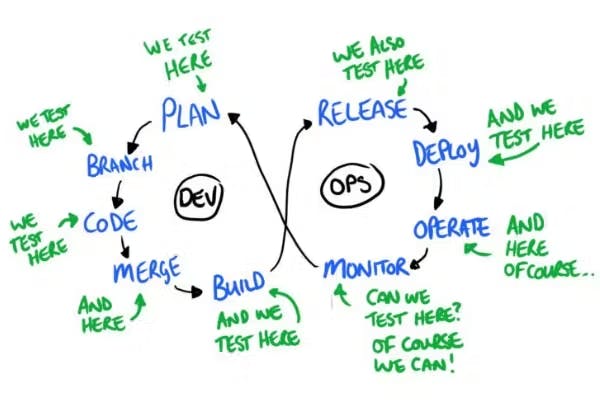DevOps is a term for a combination of concepts, philosophies, practices, and tools, that have set off a movement and is rapidly spreading in the technology industry. It is the application of agile and lean approaches to operations work. The operations and development engineers work together throughout the whole development lifecycle to create and operate systems that can keep up with the increasingly service-oriented industry. Practices and departments that were once isolated are in collaboration to streamline the process. With DevOps, organisations can develop applications and systems at high speed while still ensuring that the highest quality and standards are met. This makes way for better services, efficient processes, and happier customers.

How does DevOps work?
In the DevOps model, the development and operation department, formerly siloed, form one team that will work from the development, to testing, to operations, helping automate processes that were once manually done. In some cases, quality assurance and security teams are also integrated into the model; this speeds up the delivery of your systems and software and ensures that your processes and products are more reliable. With a streamlined and improved system and process combined with the latest technology advancements, you can provide more value to your customers.

How do businesses with DevOps model operate?
DevOps requires a drastic change in the culture and mindset of the people in your business. Teams that were once working independently will now be working closely to optimise the processes of both the Development and Operations Department. This unified team, regardless of the business’ organisational structure, will take responsibility in the whole development and production lifecycle. In all this, the goal should be clear: create an optimised process that will help the business understand the end consumer’s needs and how to help them meet those needs. A change this drastic cannot be implemented overnight. In the DevOps model, organisations perform frequent yet smaller updates, as opposed to huge, organisational-wide updates which were done traditionally. This process lowers the risk as teams could spot bugs faster because it is easier to identify the last update that caused it.

The Importance of DevOps
With technology taking over the business landscape, software is no longer just a support for your business, it has become an integral part of its structure. From operations to actual interactions with customers, software is widely used to optimise processes and user experience. With this, it is self-evident that business owners must invest in, develop and transform the best software and systems to maintain a competitive edge in their industry. The DevOps model ensures that the process of developing and optimising these systems is uninterrupted for continued customer satisfaction. Furthermore, transparency and feedback are key for a high performing DevOps team thus, the DevOps model creates a culture of collaboration and trust. Departments that were once autonomous are now sharing the responsibility of creating a system for the whole company to achieve a unified goal. DevOps is breaking down barriers and combining the invaluable inputs of two integral parts of the business to help propel it to the top. DevOps model, put simply, is the collaboration of specialists and experts with one goal: to automate, streamline, and develop processes within the business that will ultimately meet the needs of your target market.
To know more about DevOps and how it could be best integrated into your business model, visit April9’s website or get in touch to schedule your digital consultation today.









